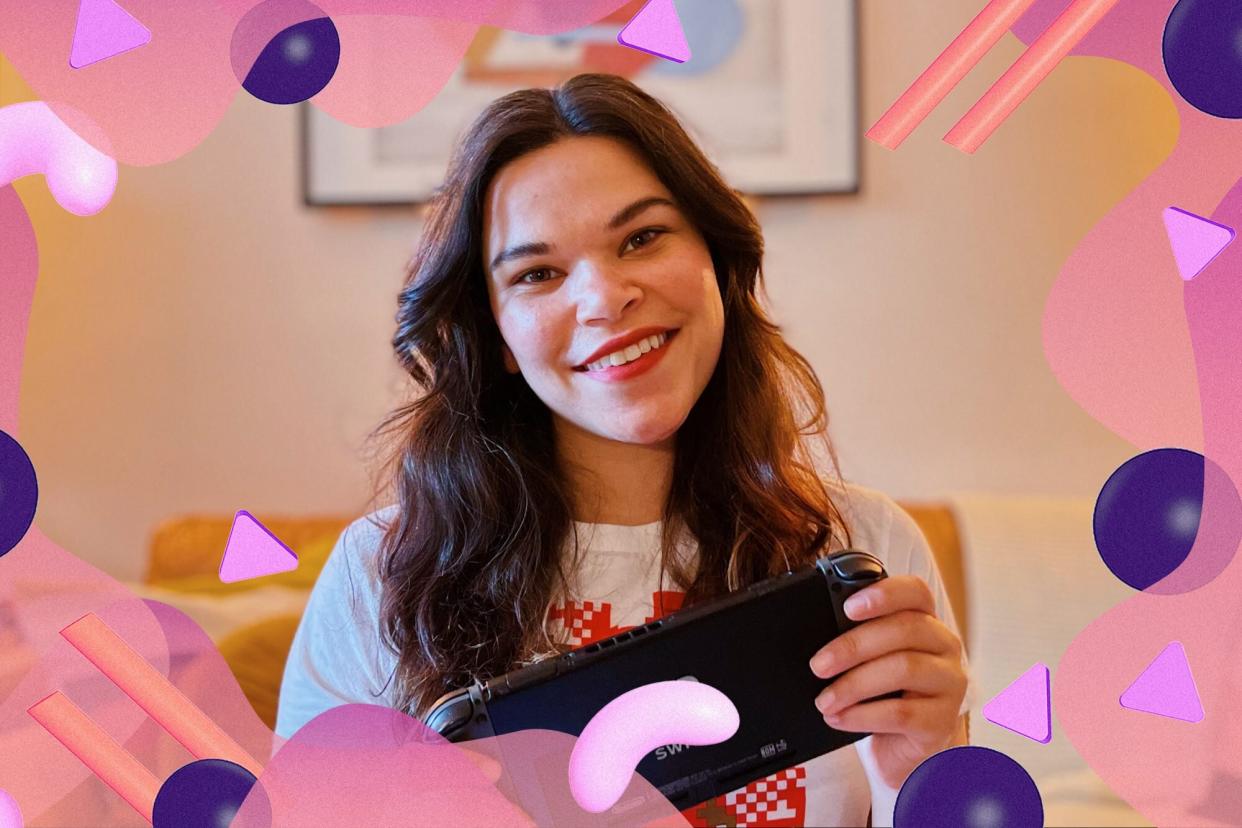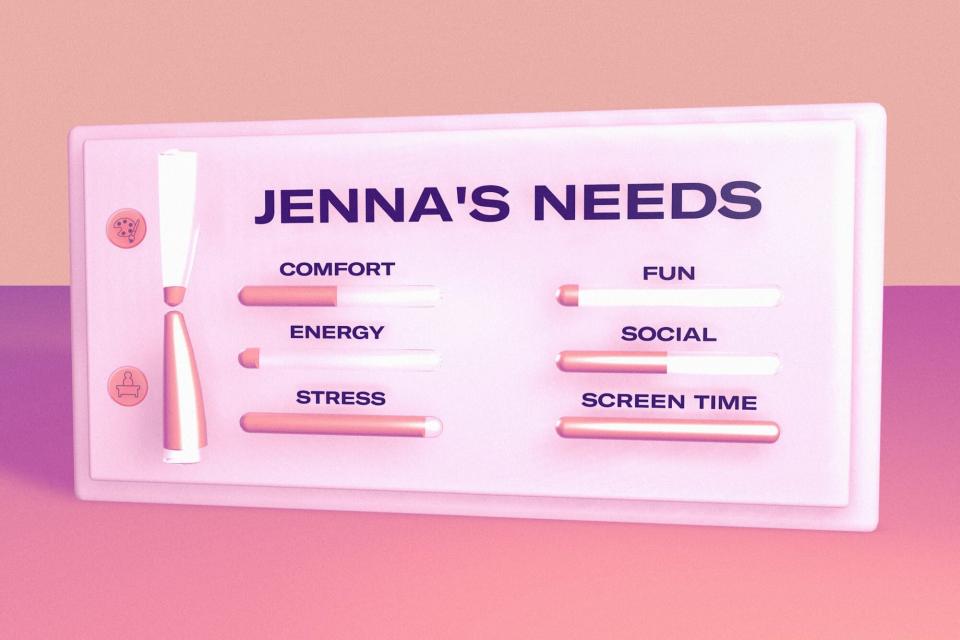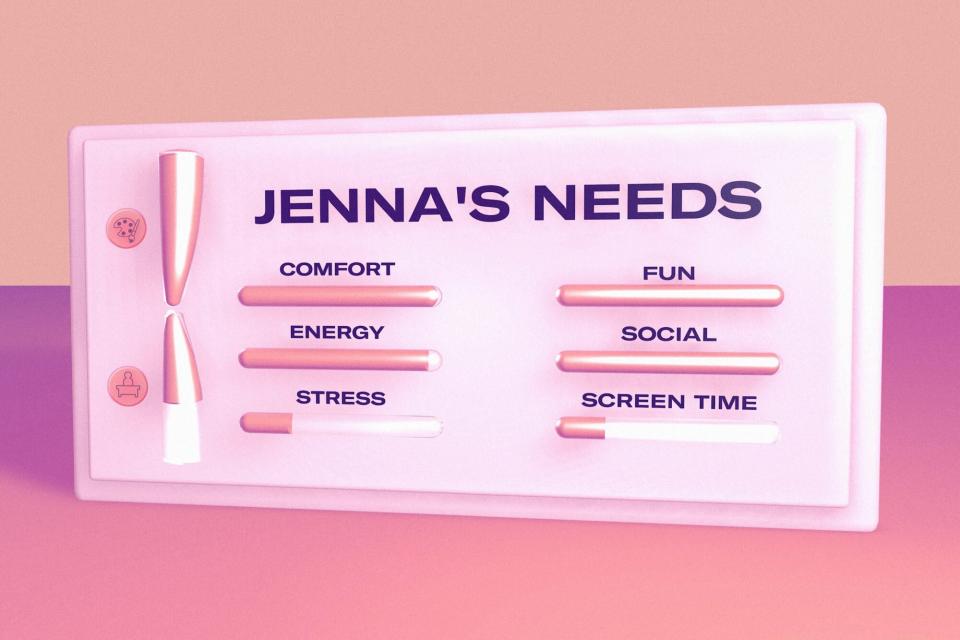Playing Video Games Was the Burnout Cure I Didn’t Know I Needed

Photo: Jenna Brillhart, Illustration: Sarah Maiden
Female gamers are often under-recognized and discredited within their male-driven industry, despite making up nearly 41 percent of all gamers in the United States. That's why this month, we're highlighting the women who are changing the gaming industry with The Game Plan. Here, we're diving into the world of drag queen gamers, the surprising ways gaming can affect your mental health, and so much more. Play on.
Last year, after months of being isolated by myself in my apartment with no way to escape from the weekly burnout caused by my job and the outside world, I—a self-proclaimed introvert—found myself longing for social interaction and connection. My relationship with my phone, something I used to easily leave in another room for hours at a time, suddenly became a lifeline to connect with others, providing me with the solace I and many other Americans needed during such an uncertain time.
However, I quickly found that social media and news sites were not welcoming places to turn to for connection. Whether it was because of politics, social comparison, or a constant flow of social injustices, my new doomscrolling habit created a whole new set of stressors for my body to deal with, such as feeling constantly fatigued. While I tried to set time limits on my phone, revive my Kindle (which had been packed away since 2007), and even attempted to take a bath or two, the same robotic thought of, "I'm just going to check my feed one last time," would take over and I would pick up my phone instead. Ignoring the screen time limit for the day, I'd lose myself to an endless feed of news, beauty trends, and TikTok dance videos.

Sarah Maiden, HelloGiggles
As my burnout from work and the pandemic continued to increase, I knew I needed to do something to break myself out of my newly formed habit in order to feel less stressed.
So one day, with all of the determination I could possibly muster, I put my phone in another room and turned on a video game.
I'm not new to gaming, but I also wouldn't call myself a gamer. When I was little, my family had a Nintendo Entertainment System (NES) as well as a GameBoy on which we'd play games like Super Mario Brothers and Duck Hunt. Eventually, I got my very own atomic purple GameBoy Color for Christmas in 1998, where I graduated to playing Pokémon, a new world of role-playing games. This set the course for my gaming preferences as I got older, when desktop games, like The Sims, became more of my jam. I'd sit down for hours building houses, exploring all of the endless Sims game packs. This type of mindless clicking provided me an opportunity to get lost in my own little world for hours at a time.
Years later, simulation games, like The Sims and Animal Crossing: New Horizons, were the first video games I turned to as a means to tackle my stress during the pandemic. At first, it was fun. I found myself building houses I wish I were quarantined in, and my island in Animal Crossing became a nice virtual getaway for a bit of time. However, while the monotony of simulation games has proven to cause a positive bump in users' mental health, the mindless tasks I was doing in both games weren't enough to fully tackle the burnout and stressors my body was feeling. I found myself returning to reality and the inevitable usage of my phone, and as a result, my stress continued to build.
To help understand why I couldn't shake my anxiety, I talked to Emily Nagoski, PhD and co-author of Burnout: The Secret to Unlocking the Stress Cycle. Dr. Nagoski explains that when you have heightened levels of adrenaline and cortisol in your body (like during a pandemic), doing mindless things to distract yourself (which might've worked in a pre-pandemic world) is no longer emotionally or physically enough to conquer stress. In order to heal, mindless tasks need to be replaced with mindful ones.
So, instead of my go-to "make everything look really good" approach for The Sims or Animal Crossing (a perfectionist trait to be tackled at another time), I needed to add a more physical aspect to gameplay. "The key is to imagine yourself viscerally in [simulation games]," Dr. Nogoski tells HelloGiggles. "Not just sitting back and making things happen on a screen but investing emotionally in what you're doing by imagining what it would be like to be sitting [in your quarantine house or island home] or hand in hand with another character. It's about oscillating between the exposure and your healing.
The more intense [the stress] is, the more intense your healing needs to be."
However, the mental effects of the pandemic were blocking any ability for me to be imaginative or creative (which, as an art director, was highly problematic to my day-to-day success). Burnout defines this state as "freeze"—when your parasympathetic system kicks into gear, causing you to feel "disengaged from the world." Even so, Dr. Nagoski explains that during moments of intense stress, simulation games can still help you release those activated stressors—if you add movement of your muscles into the mix. "I love the idea of a game like Animal Crossing, where you're just tooling around and building something—because, at the same time you're doing that, you can do things with your body like stretching your neck or going from lying down to sitting up," she says.
The physical practice of moving my muscles, like tensing and releasing them, while playing a game allows for me to break down my stress in bits and pieces, helping me to slowly break myself out of freeze. This is because moving my body while playing video games as stressors are reactivated in my body creates a healing cycle from the tension and stress I gain from reading the news or seeing distressing information on social media.
However, for this mindful practice to be successful, it does require an awareness of the kind of stress your body is experiencing. Once you notice this stress, it puts you in a position of needing to do something about it. Due to my lack of creative drive while in freeze, I had an inkling that in comparison to simulation games, doing this practice with fighter and first-person shooter/role-playing games would provide a better stress release for me. As someone who is working on being more mindful of my stressors, I'm aware that freeze occurs much more frequently for me, and is more difficult to break out of. So, when I'm playing these types of high-intensity games, my body's natural response is to tense up without a lot of effort on my part.
I broke out an old favorite of mine to test out this theory. BioShock, a first-person shooter and role-playing game set in a fictional underwater utopia called Rapture (a city created as an escape from oppressive world governments), seemed like a natural choice for this tense and release practice. The added horror aspect of the game sends literal chills throughout my body every time I play and the only way to feel like you won is to play the whole game through to the end.
So, I once again put my phone in the other room, situated myself on my couch and turned on the game. When I finally got to the climactic moment of fighting the final villain, I allowed the natural tensing of my muscles to fully take over. And the moment I dealt the final blow to him, I jumped up and did a victory dance (apologies to my downstairs neighbors). For what it's worth, for anyone, like myself, who has been mocked for their victory dances after winning a battle or alternatively has gotten in trouble for throwing a controller or two, Dr. Nagoski says we are doing everything right, as long as we are releasing our stressors responsibly and not causing others harm in the process.
"Allow the victory or even the loss to be as big in your body as the battle is...If you just hold on to your emotions and allow for the next tension to start, without letting yourself do a big, raging 'aghhh,' you are potentially doing yourself harm by holding onto that stress and keeping that in your body," she says.
The release the celebration caused, aided by the game credits rolling on the screen, created a complete sense of ease to wash over me, with the stress of the week fading away.
In that moment, I truly felt my body relax, the weight on my shoulders and chest no longer present. The exhaustion and happiness of gameplay also caused what was probably the most restful night of sleep that I've had in quite some time.

Sarah Maiden, HelloGiggles
The next day, when I woke up still reeling from the success of winning the game, a part of me wanted to do it all again—like a kid after riding a roller coaster. Whatever stressors I had deactivated from my gameplay the day before freed my brain from freeze and provided a less cloudy worldview when I woke up. As the weight was lifted, so was the doom and gloom caused by burnout. The cogs in my head, getting some much-needed grease, were churning again. It even made me want to try playing the Sims and Animal Crossing again, as those emotionally invested tasks felt like they could be more doable.
Still, I'm not going to lie—by midday, I was itching to open Instagram on my phone again. Playing Bioshock may not have kicked my phone addiction, but it at least put me in a better mental space to tackle whatever was waiting for me back in the real world.
As more and more people start to get vaccinated, pandemic-related stressors will also start to evolve. Dr. Nagoski explains, "As people start to get vaccinated and it is acceptable for you to go out and be in the world, there are going to be changes that happen to your brain as a result of the isolation that are going to make your brain react to social interaction more as if it were threatened or potentially unsafe—which makes sense because it's a novel stimulus that is now potentially overwhelming. So there is going to have to be a gradual process to re-engaging with the world."
But she believes gaming can create low-cost social interactions that can provide people like me with a slow and easy re-entrance. She suggests visiting friends' islands on Animal Crossing or grabbing a group for a more routine game of Among Us. "If you're playing a game with someone, you're sharing a goal together, you're collaborating. It can be a very rewarding and enriching experience that can compensate for some of the struggle of being isolated," Dr. Nagoski says.
As I slowly re-enter society, I still have a long way to go before I start to become less dependent on my phone and doomscrolling. While putting my phone off to the side while I play a video game might help me work through my current stressors, the stress of social media and the outside world will still always be waiting for me at the end of that victory dance. At least now, when I feel those stressors activate and my body begins to freeze, I know how sweet that victory dance can be if I simply allow myself to feel it.
Read more stories in The Game Plan here.

